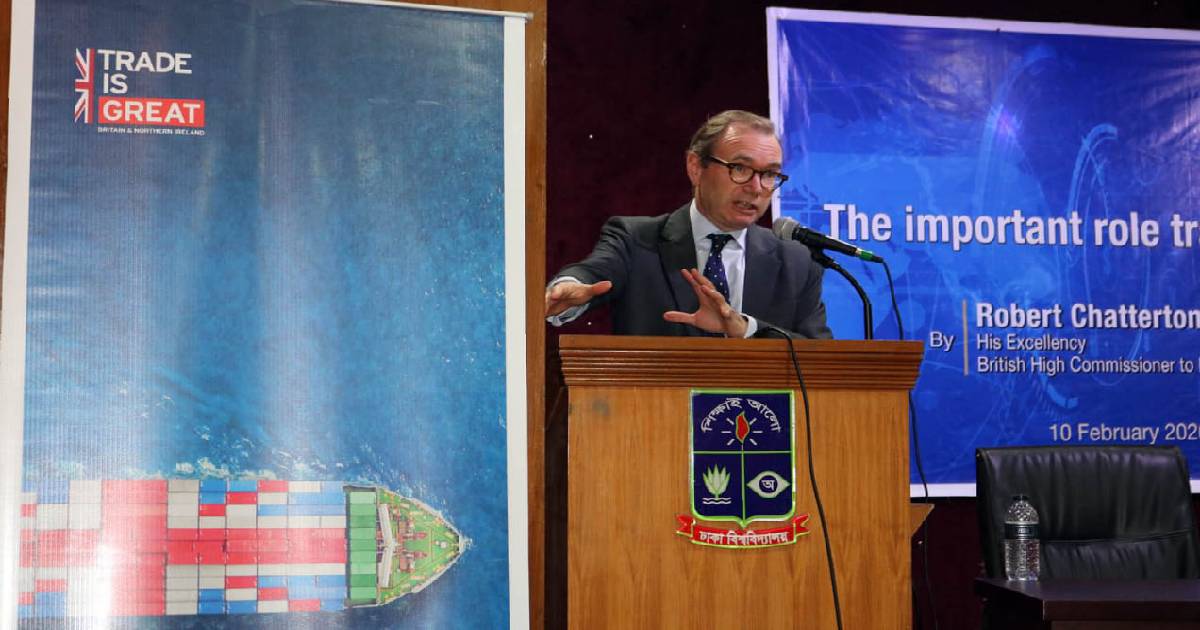Bangladesh needs more know-how, jobs, investment to keep up growth: UK

Image collected
British High Commissioner to Bangladesh Robert Chatterton Dickson on Monday said Bangladesh needs more know-how, more jobs and more capital to keep the remarkable growth noting that FDI can offer that.
“Foreign investments might help upskill a workforce," he said mentioning that Bangladesh did remarkably well in the 50 years since independence - something the country can be genuinely pleased with.
The British High Commissioner made the remarks while delivering a lecture on ‘The Importance of International Trade’ at the Department of International Business, University of Dhaka.
Over 200 students from Department of International Business, Dr. Shobod Deba Nath, Associate Professor, Chairman, Department of International Business, University of Dhaka, Derek Griffiths, Head of Trade & Investment Bangladesh, Department for International Trade, British High Commission Dhaka, and other faculty members of Dhaka University and staff of the British High Commission Dhaka attended the lecture.
After the lecture, students had the possibility to ask questions to the British High Commissioner on UK-Bangladesh diplomatic and trade relationship, ease of conducting business, and impact of Brexit on Bangladesh trade.
Prior to his lecture, the British High Commissioner met Dr. Md. Akhtaruzzaman, Vice-Chancellor of the University of Dhaka.
The British envoy said many of the managers in Bangladesh’s private banks are suffering from their careers in HSBC or Standard Chartered - two British banks.
He said the town of London, home for some of the World’s best known financial institutions, can help access capital.
On the UK’s withdrawal from the EU, the High Commissioner said on January 31 they left europe after 47 years of membership.
"For the very first time since 1973 we are a fully sovereign nation in a position to control our own destiny. Which includes trade," he said.
High Commissioner Dickson said between now and the end of the year they'll use the EU to negotiate a free of charge trade agreement, drawing on other recent agreements, such as the one between your EU and Canada."That needs to be the core of our future relationship."
The High Commissioner discussed the phenomenal rise of Bangladesh’s RMG industry saying overtime the comparative advantage could be eroded by competitors.
"That’s why, to keep up growth, Bangladesh must move up the worthiness chain and diversify its exports. And what’s best for Bangladesh is also good for the united kingdom - that’s the basis of Free Trade - if our companies can supply or partner yours to help them are more competitive.”
On UK-Bangladesh trade relationship, the High Commissioner emphasised that because they become Global Britain, they will be developing new partnerships and building on historic friendships.
"There are few places on the planet where these opportunities are higher than here in Bangladesh because of the a large number of personal connections between us," he said.
The High Commissioner said, “As Britain we have there been at the start. Recently I was reading a few of the British media commentary from 1971. It really is clear that UK thoughts and opinions through the liberation struggle was overwhelmingly privately of Bangladesh."
He said January 1972 saw Bangabandhu greeted in Downing Street by the then British Prime Minister, Edward Heath.
Then returned to a newly independent Bangladesh within an aircraft of the British Royal Air Force.
The High Commissioner said fifty years on, Bangladesh gets the speediest growing large economy on the globe.
He said the UK is Bangladesh’s second most significant single market and second greatest way to obtain international investment.
Marks and Spencer, Unilever, HSBC and Standard Chartered are some of the British companies successful here.
"I would love more to join them. Our persons to persons inks are close. Nowadays there are some 600,000 British citizens of Bangladeshi heritage," said the High Commissioner.
This consists of four members of the Parliament elected in December along with doctors, lawyers, entertainers, engineers and, of course, the owners of most of Britain’s Indian restaurants.
"We are seeing proof the Bangladeshi diaspora looking for investment opportunities ‘back home’, spurred on by the country’s growth. A good example of the benefits associated with bilateral trade," said the British envoy.
The High Commissioner concluded his speech by saying, “I am hoping I’ve set out obviously why the British Government believes wholeheartedly in Free Trade as the cement that binds countries together and helps everyone prosper."
He said they in Britain are getting into a thrilling new chapter of their long history.
"We do in order a confident, independent nation taking a stand for our values of democracy and free trade. We do so alongside our friends in Bangladesh, a partnership which is evolving as Bangladesh moves towards middle class status.”
Source: http://unb.com.bd
Previous Story
- Halal travel: the most popular holiday destinations for...
- UK assures Bangladesh of providing support for enhancing...
- KSA continues to deport Bangladeshi workers
- Apparel Brands Shouldn’t Confuse ‘Nearshoring’ with Ethical Production
- Supply chain actors connected at GOTS Bangladesh seminar
- Bicester Village to host The Modist's first European...
- ‘Banai’ to the next round in Hult Prize
- Facial Recognition and the Fight for Diversity